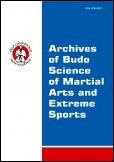2020, Volume 16, Issue 1
Wrestling – antique lineage of modern form of combat sports
Artur Kruszewski1, Ilia Cherkashin2, Elena Cherkashina3
1Department of Individual and Team Sports , Jozef Pilsudski Uniwersity of Physical Education in Warsaw, Warsaw, Poland
2North-Eastern Federal University | Yakut State Agricultural Academy | Moscow State Academy of Physical Culture in Moscow Region, Yakutsk, Russia
3Institute of Physical Culture and Sports, North-Eastern Federal University, Yakutsk, Russia
Author for correspondence: Artur Kruszewski; Department of Individual and Team Sports , Jozef Pilsudski Uniwersity of Physical Education in Warsaw, Warsaw, Poland; email: Artur.kruszewski@awf.edu.pl
Full text
Abstract
In Ancient Greece, agonistics was supported by philosophy and science’s arguments, ethical regulations, ideological and political rights and religious norms. Each of these forms of collective consciousness emphasized various qualities of physical culture, it even obliged to care for physical efficiency. Widespread intellectual and emotional acceptance made sport an attribute of Hellenic lifestyle: naked, gleaming with olive oil, well-build body distinguished Greek from barbarian, as much as language and religion. Heracles is a mythical patron of wrestling, and sportsmen who were successful in wrestling and pankration were called “ones from Heracles”. Pausanias states that “Theseus discovered the art of Wrestling” because he conquered Kerkuon thanks to his intelligence. Kalina made the research of philosophical-humanistic aspects of combat sports and martial arts influence on modern society, by formulating rules of theory of combat sports (assuming that: “every combat sport is martial arts but not vice versa”). Empirical rationale of cognitive-behavioural prophylactic and therapeutic agonology (innovative agonology) were developed by Kalina.
From the young people’s interest in physical education point of view, wrestling – as a gentle form of combat (being also form of self-defence) – seems to be ideal way of influencing. Teachers, using entertaining elements of wrestling matches during physical education classes, have enormous educational opportunities. Implementing adherence to these basic rules of fight ethic – especially in relation to newcomers – as well as introducing and forming young adepts with regard to such values, like courage, well-established pride, fidelity, loyalty, and above all honour, should determine one of main goals of educational and instructional work for teachers and coaches.
Key words: antic wrestling, innovative agonology, martial arts, theory of combat sports





